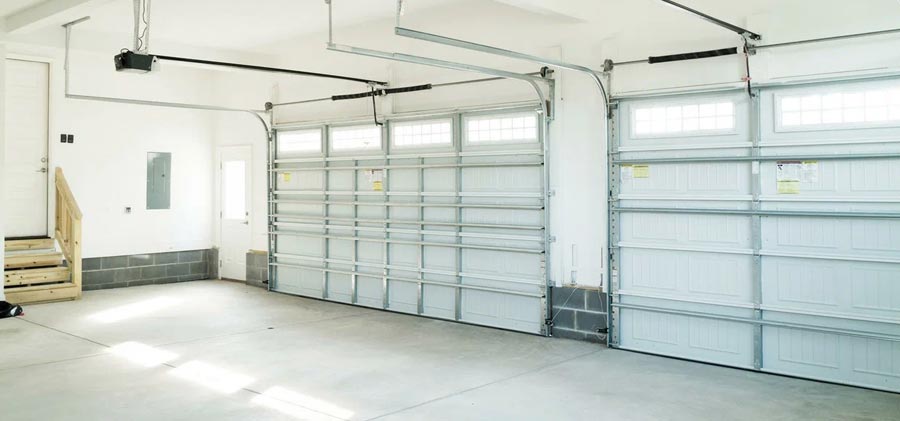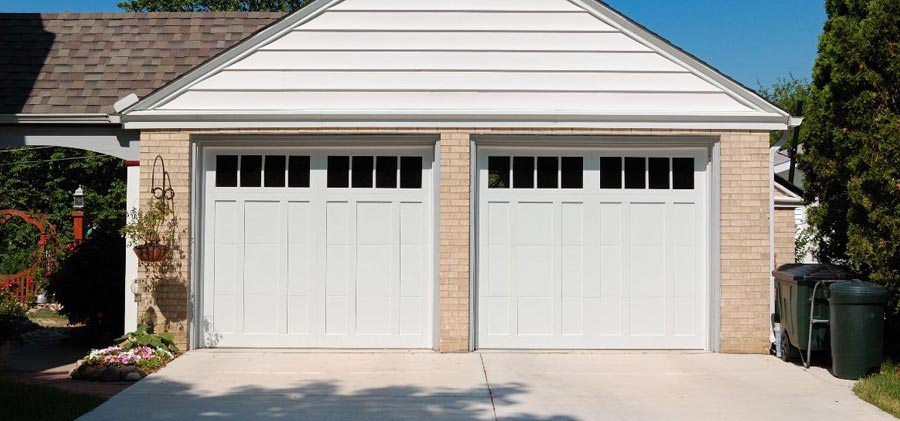Are you tired of your noisy garage door? You should understand different types of noises your garage door makes to address the underlying issues.
Often garage doors make noises like squeaking, popping, thumping, and grinding. Sometimes, we ignore these sounds until we notice critical issues. So, you should understand these sounds to make garage door noise fix. You should follow lubrication tips to fix these issues initially or contact a professional to address critical issues.

Different Types Of Garage Door Noises
There are different types of sounds that a noisy garage door makes. Let’s understand these noises and what they indicate.
Popping Sounds
If your garage door makes a popping noise when it opens, there might be an issue with the torsion springs. It can also sound like clunking or grinding.
To fix this, check the springs for damage and add some lubricant to help with the noise.
Popping sounds can also come from a broken or loose hinge, or if the parts like the torsion assembly, tracks, or brackets are not lined up properly. Inspect the whole system to identify the noise-causing components and make garage door noise fix to address the issue.
If you’ve recently painted your garage door, the popping noises could be just the paint drying. This is normal as the paint bonds to the door, so it usually isn’t a problem.
Also, if your garage door opener makes popping sounds, it might mean the sprocket is damaged or breaking. Check the opener and replace the gear and sprocket assembly if needed.
Thumping and Banging Sounds
If you’re dealing with a noisy garage door, you should understand the noise-causing components to address these issues.
A loud, one-time bang from the garage often indicates a broken spring, which can abruptly release stored torque during a snap.
When this occurs, the garage door is likely to fail to open, requiring a replacement of the broken spring.
Additionally, thumping and banging noises while the garage door moves up and down can signal issues with the door’s structure. Cracks or damage in one or more door sections may lead to buckling under their own weight, preventing the door from closing properly or causing it to come off its tracks.
To address this, you can reinforce worn sections with designated struts or consider replacing them.
For electric overhead garage doors, noises can stem from a misconfigured or faulty opener’s travel system.
A defective travel module or limit switch may cause excessive movement along the opener’s rail, producing annoying sounds.
Garage door Squeakingand Squealing Sounds
If you notice garage door squeaking sound, it usually means there’s a problem with parts like the rollers, bearings, or hinges. These noises often come from friction between the metal parts.
You can fix a squeaky garage door by finding where the noise is coming from and using lubrication on those parts. If the rollers or bearings are damaged, you might need to replace them.
Here are some lubrication tips:
- Identify the squeaky areas.
- Apply a silicone-based lubricant or garage door spray to the rollers, bearings, and hinges.
- Wipe away any excess lubricant. This should help reduce the squeaking sounds.

Screeching Sounds
If you have noisy garage doors, screeching sounds may mean the top and bottom brackets are stuck on the tracks. Check the brackets and fix the tracks if needed.
You might hear a grinding noise in your garage door when the opener trolley is worn out, the torsion assembly is misaligned, or the rollers are faulty. Look for metal shavings around the torsion assembly and inspect the trolley, cables, and rollers for wear.
Cracking Sounds
If your garage door is cracking, it could be due to loose hinges, tracks, or bolts. It can also happen because of normal wear and tear. Tighten any loose screws and use lubrication tips to help reduce noise.
Humming and Buzzing Sounds
Humming or buzzing from your electric garage door opener is generally caused by vibrations. Loose parts or misalignment can make these noises louder.
If the humming or buzzing sounds come with a problem, check the motor, transformer, or other noise-causing components. Look for error codes and inspect the carriage. If it’s stuck, loosen the chain or belt and fix it.
Clicking Noise
A single-clicking noise may indicate issues with the opener’s transformer, capacitor, or motor. Check for error codes and repair any faulty parts.
If your garage door opener clicks 6 to 10 times with blinking lights and won’t close, the sensors might be misaligned, dirty, or blocked. Clean them with a dry cloth and check for damage. Align or replace the sensors as needed for a garage door noise fix.
FAQs
A grinding noise often happens when the door’s moving parts need lubrication. It could also mean that there is something stuck in the tracks. It’s a good idea to check and clean the tracks and apply some lubricant.
A squeaking noise usually means that the hinges or rollers are worn out or need lubrication. You can use some grease on these parts to help eliminate the squeaking.
A loud banging sound might indicate that the door is not balanced properly or that there are loose parts. This can be dangerous. It’s best to stop using the door and contact a professional to check and fix the issue.


